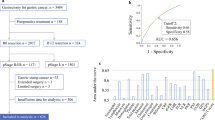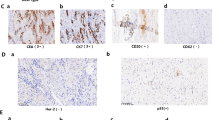Abstract
Objective
To evaluate the effects of three nutritional scoring systems: Prognostic Nutritional Index (PNI), Controlling Nutritional Status (CONUT), and Naples Prognostic Score (NPS) on the short- or long-term prognosis of gastric cancer (GC) patients who underwent radical gastrectomy.
Methods
The clinicopathological data of 2182 patients who underwent radical gastrectomy at the Fujian Medical University Union Hospital (FMUUH) from 2009 to 2014 were retrospectively analyzed. The effects of the PNI, CONUT, and NPS on the short- or long-term prognosis of GC patients were analyzed.
Results
Overall, 359 (16.5%) patients had postoperative complications. There was no significant association between the PNI, CONUT, and NPS and postoperative complications (P > 0.05); however, high CONUT and NPS were significantly associated with severe postoperative complications (P < 0.05). Univariate analysis showed that PNI, CONUT, and NPS were all associated with overall survival (OS) (P < 0.001). However, multivariate analysis showed that only PNI was an independent risk factor for OS (P = 0.004), and the 5-year OS rate in the low PNI group was significantly lower than that in the normal PNI group (55.5% vs 75.4%, P < 0.05). The area under the curve (AUC) and the c-index of PNI were significantly higher than those of CONUT and NPS. The prognostic efficiency of combining PNI and TNM stage was also significantly better than that of TNM staging alone (P < 0.05).
Conclusion
The current study demonstrated that CONUT and NPS are important for assessing the risk of severe postoperative complications. However, PNI is an independent risk factor for the long-term prognosis of GC patients who underwent radical gastrectomy and can improve the prognostic efficiency of TNM staging.


Similar content being viewed by others
References
Bray F, Ferlay J, Soerjomataram I, et al. Global cancer statistics 2018: GLOBOCAN estimates of incidence and mortality worldwide for 36 cancers in 185 countries. CA Cancer J Clin 2018;68:394–424.
Noh SH, Park SR, Yang HK, et al. Adjuvant capecitabine plus oxaliplatin for gastric cancer after D2 gastrectomy (CLASSIC): 5-year follow-up of an open?label, randomised phase 3 trial. Lancet Oncol. 2014;15:1389–1396.
Sasako M, Inoue M, Lin JT, et al. Gastric Cancer Working Group report. Jpn J Clin Oncol. 2010;40(suppl 1):i28–i37.
Paccagnella A, Morassutti I. Nutritional intervention for improving treatment tolerance in cancer patients. Curr Opin Oncol 2011;23:322–330.
Borre M, Dam GA, Knudsen AW, Gronbaek H. Nutritional status and nutritional risk in patients with neuroendocrine tumors. Scand J Gastroenterol 2018;53(3):284e92.
Fujiya K, Kawamura T, Omae K, Makuuchi R, Irino T, Tokunaga M, et al. Impact of malnutrition after gastrectomy for gastric cancer on long-term survival. Ann Surg Oncol 2018;25(4):974e83.
Maasberg S, Knappe-Drzikova B, Vonderbeck D, et al. Malnutrition predicts clinical outcome in patients with neuroendocrine Neoplasia. Neuroendocrinology. 2017;104:11–25.
Zhao Y, Xu P, Kang H, et al. Prognostic nutritional index as a prognostic biomarker for survival in digestive system carcinomas. Oncotarget 2016;7:86573–86583.
Kuroda D, Sawayama H, Kurashige J, et al. Controlling nutritional status (CONUT) score is a prognostic marker for gastric cancer patients after curative resection. Gastric Cancer. 2017;21:204–212.
Galizia G, Lieto E, Auricchio A, et al. Naples Prognostic Score, Based on Nutritional and Inflammatory Status, is an Independent Predictor of Long-term Outcome in Patients Undergoing Surgery for Colorectal Cancer. Dis Colon Rectum 2017;60:1273–1284.
Japanese Gastric Cancer Association. Japanese classification of gastric carcinoma. 3rd English edition. Gastric Cancer 14:101–112,2011.
Onodera T, Goseki N, G. K. Prognostic nutritional index in gastrointestinal surgery of malnourished cancer patients. Nippon Geka Gakkai Zasshi. 1984;85:5.
Jiang N, Deng JY, Ding XW, et al. Prognostic nutritional index predicts postoperative complications and long-term outcomes of gastric cancer. World J Gastroenterol 2014;20:10537–10544.
Dindo D, Demartines N, Clavien PA. Classification of surgical complications: a new proposal with evaluation in a cohort of 6336 patients and results of a survey. Ann Surg 2004; 240: 205–213.
Camp RL, Dolled-Filhart M and Rimm DL. X-tile: a new bio-informatics tool for biomarker assessment and outcome-based cut-point optimization. Clin Cancer Res. 2004; 10(21):7252–7259.
Schwegler I, von Holzen A, Gutzwiller JP, et al. Nutritional risk is a clinical predictor of postoperative mortality and morbidity in surgery for colorectal cancer. Br J Surg 2010;97:92–97.
Hu WH, Cajas-Monson LC, Eisenstein S, Parry L, Cosman B, Ramamoorthy S.Preoperative malnutrition assessments as predictors of postoperative mortality and morbidity in colorectal cancer: an analysis of ACS-NSQIP. Nutr J 2015;14:91.
Schueneman AJ, Sugar EA, Uram J, Bigelow E, Herman JM, Edil BH, et al. Low total lymphocyte count is associated with poor survival in patients with resected pancreatic adenocarcinoma receiving a GM-CSF secreting pancreatic tumor vaccine. Ann Surg Oncol. 2013;20(Suppl 3):S725–30.
Lien YC, Hsieh CC, Wu YC, Hsu HS, Hsu WH, Wang LS, Huang MH, Huang BS. Preoperative serum albumin level is a prognostic indicator for adenocarcinoma of the gastric cardia. J Gastrointest Surg 2004;8:1041–1048.
Chan JC, Chan DL, Diakos CI, et al. The Lymphocyte-to-Monocyte Ratio is a Superior Predictor of Overall Survival in Comparison to Established Biomarkers of Resectable Colorectal Cancer. Ann Surg 2017;265:539–546.
Suzuki Y, Okabayashi K, Hasegawa H, et al. Comparison of Preoperative Inflammation-based Prognostic Scores in Patients With Colorectal Cancer. Ann Surg 2018;267:527–531.Shimada H, Takiguchi N, Kainuma O, et al.
Kang R, Li P, Wang T, Li X, Wei Z, Zhang Z, et al. Apolipoprotein E epsilon 2 allele and low serum cholesterol asrisk factors for gastric cancer in a Chinese Han population. Sci Rep.2016;6:19930.
Yang Y, Gao P, Song Y, et al. The prognostic nutritional index is a predictive indicator of prognosis and postoperative complications in gastric cancer: A meta-analysis. Eur J Surg Oncol 2016; 42:1176–1182.
Ryo S, Kanda M, Ito S, et al. The Controlling Nutritional Status Score Serves as a Predictor of Short- and Long-Term Outcomes for Patients with Stage 2 or 3 Gastric Cancer: Analysis of a Multi-institutional Data Set [J]. Annals of surgical oncology, 2018,():.
Sun KY, Xu JB, Chen SL, et al. Novel immunological and nutritional-based prognostic index for gastric cancer. World J Gastroenterol 2015;21:5961–5971.
Yoshida N, Harada K, Baba Y, et al. Preoperative controlling nutritional status (CONUT) is useful to estimate the prognosis afteresophagectomy for esophageal cancer. Langenbecks Arch Surg. 2017; 2: 333–341.
Graziosi L, Marino E. Survival comparison in gastric cancer patients between 7th and 8th edition of the AJCC TNM staging system: The first western single center experience. Eur J Surg Oncol 2018;:.
In H, Solsky I, Palis B, et al. Validation of the 8th Edition of the AJCC TNM Staging System for Gastric Cancer using the National Cancer Database. Ann Surg Oncol 2017; 24: 3683–91.
Gao ZM, Wang RY, Deng P, et al. TNM-PNI: a novel prognostic scoring system for patients with gastric cancer and curative D2 resection. Cancer Manag Res 2018; 10: 2925–2933.
Group G, Paoletti X, Oba K, et al. Benefit of adjuvant chemotherapy for resectable gastric cancer: a meta-analysis. JAMA. 2010;303:1729–1737.
Shimada H, Takiguchi N, Kainuma O, et al. High preoperative neutrophil-lymphocyte ratio predicts poor survival in patients with gastric cancer. Gastric Cancer. 2010;13(3):170–176.
Funding
Scientific and technological innovation joint capital projects of Fujian Province, China (No. 2016Y9031). Minimally invasive medical center of Fujian Province (No. [2017]171). Project supported by the Science Foundation of the Fujian Province, China (Grant No. 2018J01307). Startup Fund for scientific research, Fujian Medical University (No. 2016QH024).
Author information
Authors and Affiliations
Corresponding authors
Ethics declarations
Conflict of Interest
The authors declare that they have no conflicts of interest.
Human Rights Statement and Informed Consent
All procedures followed were in accordance with the ethical standards of the responsible committee on human experimentation (institutional and national) and with the Helsinki Declaration of 1964 and later versions. Informed consent or substitute for it was obtained from all patients for being included in the study.
Additional information
Publisher’s Note
Springer Nature remains neutral with regard to jurisdictional claims in published maps and institutional affiliations.
Electronic supplementary material
Supplementary Figure 1
The number of patients at risk of malnutrition according to the different nutritional scoring systems. (PNG 29 kb)
Supplementary Figure 2
Kaplan-Meier analysis for the OS of GC patients in stages II and stage III according to chemotherapy. (PNG 26 kb)
Supplementary Figure 3
ROC curves of PNI, CONUT and NPS for the prediction of severe complications. (PNG 42 kb)
Supplementary Figure 4
Stratified analysis of the effect of nutritional scoring on long-term survival was performed according to the surgical method. A,B,C were the patients receiving total gastrectomies, and D,E,F were the patients receiving subtotal gastrectomies. (PNG 63 kb)
ESM 1
(DOCX 19 kb)
ESM 2
(DOCX 20 kb)
ESM 3
(DOCX 17 kb)
Rights and permissions
About this article
Cite this article
Lin, JX., Lin, LZ., Tang, YH. et al. Which Nutritional Scoring System Is More Suitable for Evaluating the Short- or Long-Term Prognosis of Patients with Gastric Cancer Who Underwent Radical Gastrectomy?. J Gastrointest Surg 24, 1969–1977 (2020). https://doi.org/10.1007/s11605-019-04360-4
Received:
Accepted:
Published:
Issue Date:
DOI: https://doi.org/10.1007/s11605-019-04360-4




